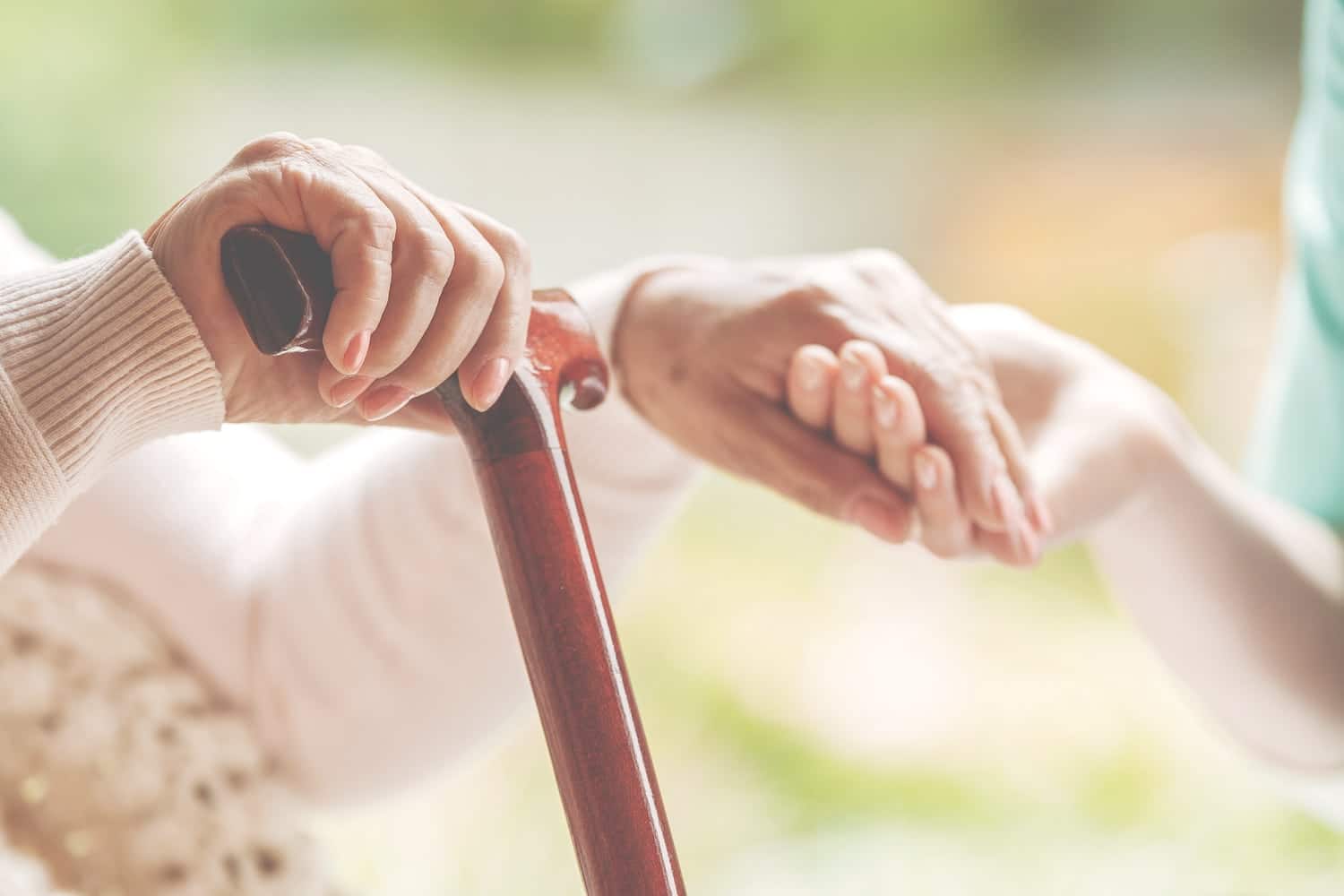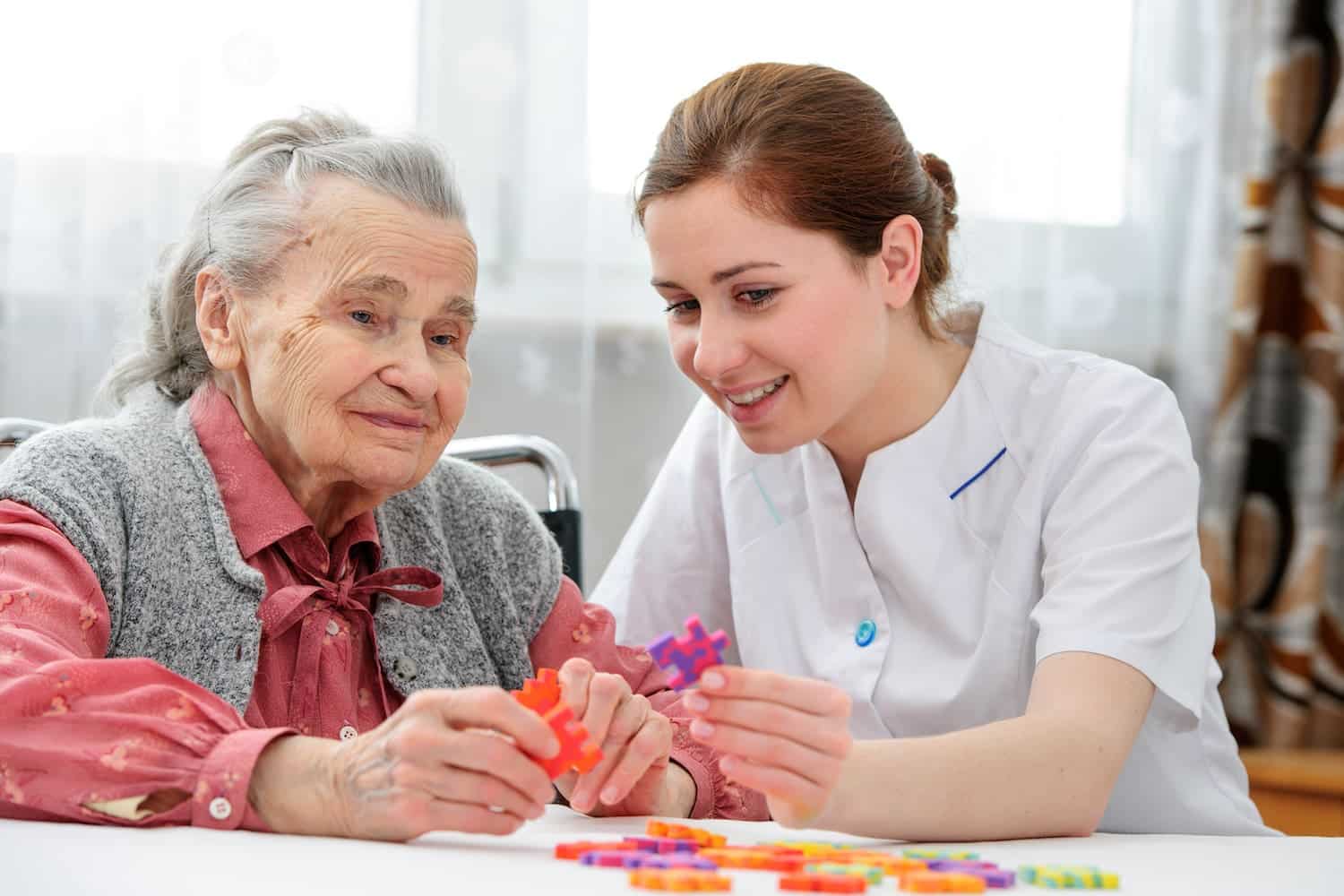Worldwide, 55 million people live with dementia, with about 5.8 million of these individuals living in the United States alone. Nearly 10 million people globally are newly diagnosed with Alzheimer’s and related dementias each year.
For family members of a person with dementia, figuring out how to provide them with the memory care they need can be daunting. While in-home care is preferable for many people, it’s not easy to know how to provide all the things they need in order to thrive.
This guide will help you set up a home environment for successful dementia care, plus other useful dementia caregiver tips.
1) Setting Up a Successful Caregiving System
When your loved one first receives this diagnosis, it’s natural to want to find as much information as you can about dementia and what they’re likely to experience in the coming months and years.
While this kind of research, provided by organizations like the National Institute on Aging, can help you come to terms with the diagnosis and gain some medical knowledge, you’ll also need additional information on how to care for individuals with Alzheimer’s and related dementias on a daily basis.
2) Providing Care for Early-Stage Dementia
If your loved one is in the early stages of Alzheimer’s or dementia, they may be able to live a largely independent lifestyle. It’s likely that while they may still be able to drive, work, and remember most things, they may need help with:
- Managing finances
- Scheduling appointments
- Medication management
- Traveling
- Keeping their house tidy
- Maintaining overall health
Work out a system with your loved one that provides them with the support they need while allowing them to retain their autonomy. For example, your loved one may not need live-in support, but perhaps they would benefit from a daily phone call or text message from you to see how their day is going and to remind them of any important meetings or appointments.
Check in often to make sure that your system is working and that the person with dementia is actually getting the support they need. This is also the time to make financial, legal, and long-term care plans with your loved one. These conversations can be difficult or uncomfortable, but it’s crucial to sort these things out while your loved one is still able to play an active role in the planning process.
3) As Dementia Progresses: Middle-Stage and Late-Stage Care
As their disease progresses, your loved one’s behavior is likely to change, and you’ll need to adapt their home environment to address their new health and safety concerns. At this stage, it’s not uncommon for family caregivers to cohabitate with the individual they’re caring for.
For any changes in living situations, involve your loved one in the planning process as much as possible. Get their input on whether they want to move in with you, have you move in with them, or explore an alternate solution.
Home Safety Tips
Home safety will start to be a bigger concern than it used to be. It may no longer be safe to keep things in the house easily-accessible like:
- Heavy machinery
- Cleaning chemicals
- Firearms
- Work tools
- Prescription medications
- Other potentially dangerous items
Wandering Prevention Tips
If the person you’re caring for is prone to wandering, you can set up safety features in your home to keep them from getting injured.
- Use night lights to illuminate all the walkways in your home, and remove as many tripping hazards as you can to prevent falls.
- A monitoring system can help you track anytime your front door opens or closes.
- Gates, fences, and other outdoor barriers and thresholds can reduce the person’s risk of wandering away from your property, even if they do go outside.
Mitigating Agitation
Another common behavior change that people with dementia experience is increased agitation. Many things can cause this, including:
- Confusion
- A change in routine
- Overstimulation
- Unmet personal needs
- Lack of exercise
To decrease the likelihood that this will occur, create a calm environment at home. Play soothing music, use natural or soft lighting, and avoid playing competing background noises concurrently (for example, having the television and the radio on at the same time). If your loved one does become agitated, offer reassurance that everything is alright. Remain calm, talk with them about their concern, and make sure they have their needs met.
Communication Tips
For a person with middle-stage and late-stage dementia, it may become difficult or even impossible to communicate with spoken language. Learn to read their body language and other nonverbal cues so that you’re still able to communicate with them and respond to their needs.
4) Daily Routine Tips for Caregivers
Having a daily plan in place can reduce stress and anxiety and help plan your days more easily and predictably. As much as you can, stick to consistent mealtimes, bathing schedules, and other self-care routines. As much as you can, maintain a similar routine to the one that the person with dementia has maintained throughout their life.
For example, if they’re used to taking a walk in the morning, try to at least get outside every day before noon. If they prefer baths to showers, setting up your home environment so that they’re able to continue bathing will likely make it easier to help them maintain a self-care routine over time.
Be realistic with your expectations. While maintaining a daily routine may be helpful to your loved one, there will be days that require flexibility and patience. Leave ample time to complete daily tasks and activities. Pressure can fluster your loved one, causing unnecessary stress and agitation.
5) Planning Mealtimes
Meal time can be a big challenge for caregivers of people with dementia. Meal time can trigger some agitation and other issues, so some tips for making it as seamless as possible include:
- Plan your meals for around the same time every day.
- Plan your menus with nutritious foods that are familiar to your loved one.
- Lessen external stimuli as much as possible by turning off televisions and radios when it’s time to eat.
- Consider making soft foods or finger foods to make it as easy as possible for your loved one to get the nutrients they need.
- Planning plenty of time to eat will allow you both to enjoy your meal without feeling rushed or flustered.
6) Daily Hygiene and Personal Care
Many people with dementia struggle to maintain daily hygiene practices. As time goes on, they’ll likely need more and more support to complete these tasks.
It can help to make these tasks as simple as possible. For instance, using a dry shampoo to clean your loved one’s hair removes one step from bathing, making the overall process slightly less complex. Use verbal and visual cues to prompt them to complete the next step in their personal hygiene routine.
7) Personal Activities
Schedule time into your day for personal enrichment activities. Making music, creating art, and playing games help to add meaning, provide mental stimulation, and alleviate boredom throughout the day. If possible, make these social activities to fight against loneliness.
8) Relying on Community
Do not isolate during your time as a caregiver. Limiting your social sphere is a quick way to develop loneliness, burnout, and even resentment.
Many in-person and online support groups exist both for caregivers and for people living with dementia themselves. You and the person you’re caring for may want to seek the companionship and guidance of other people who understand what you’re each going through, and these groups are the perfect place to start building such a community.
Signing up for the Eldercare Locator and other national and local resources is another great step to help your loved one access premade meals, caregiver training and assistance, transportation, and other resources.
Connecting with your friends and neighbors early and often will also help you create a network of support. Everyday tasks will become much easier to accomplish when you know you have other people to rely on.
9) Taking Care of Yourself
To care for your loved one effectively, you need to take care of your own health too. Many caregivers report experiencing stress and burnout at some point, leading to long-term physical and emotional health complications.
Notice if you are experiencing any of these common signs and symptoms of burnout:
- Irritability
- Fatigue or persistent exhaustion
- Insomnia or difficulty sleeping
- Feelings of detachment or helplessness
- Substance use as a way to cope with daily stressors
- Withdrawal from the people and things in your life that you used to enjoy
If you notice any of these symptoms developing or getting worse, seek help immediately. Speak with a therapist about things you can do to preserve your energy while caregiving. Find ways to alter your daily routine so that caregiving is more sustainable for you.
What to Do When These Dementia Caregiver Tips Aren’t Enough
If you consistently feel like you lack the resources you need or that you are no longer able to adequately care for the health and safety of your loved one, it’s completely okay to ask for help.
This could mean finding someone to take care of your family member while you take a short-term vacation for a few weeks. It might mean hiring a nurse or other healthcare professional part-time to support you in your caregiving efforts.
Ultimately, it might even be best to work with a senior living community to ensure that your loved one receives the daily support and long-term care that they need to live the best life possible.
Get in touch with us to figure out whether our communities are right for your loved one.




